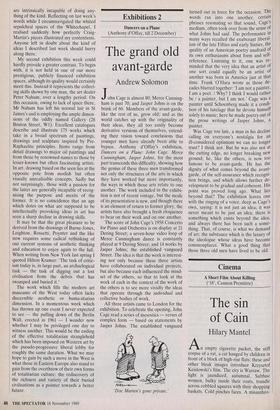Cinema
A Short Film About Killing (`18', Cannon Premiere)
The sin of Cain
Hilary Mantel
An empty cigarette packet, the stiff corpse of a rat, a cat hanged by children in front of a block of high-rise flats: these and other bleak images introduce Krzysztof Keislowski's film. The city is Warsaw. The light is jaundiced, autumnal. Subfuse women, bulky inside their coats, trundle across cobbled squares with their shopping baskets. Cold pinches faces. A misanthro-
pie taxi-driver keeps warm by polishing his taxi; a young man drifts through the city, rebuffed by those he encounters in casual conversation.
This film is one of a series about the Ten Commandments. Before turning to feature films, Keislowski was known as a maker of documentaries, and there is a documentary feel here; but as the director records the urban scene, he is picking out for us the images that convey as much as we need know about his criminal, his victim and the crime that has selected them both. The young man stares into a photographer's window, which offers back to him images of innocence and hope: of brides and grooms, of little girls in their First Com- munion dresses. We are edging, through the afternoon and evening, towards a pointless act of violence, an act of vengeance for something that is no one's fault.
Elsewhere, a young lawyer is appearing before an examining panel to obtain accre- ditation as a trial lawyer. He feels he must Justify his existence to his examiners; but during, his training, he says, he has seen things that make him wonder if there is any Point to the work. He is quizzed about his attitude to punishment, to deterrence. It seems, he says, that crime is part of the human condition; the severest punish- ments have not eradicated it. The examin- ers want him to cite texts; they ask for chapter and verse. Think of Cain, he says, and the penalty he paid. The examiners concede the point.
The lives of the lawyer and the boy touch briefly before the boy hails a taxi, and in a lonely spot on the outskirts of the city begins to murder the taxi-driver. 'Begins to murder', because the act is protracted, bloody, gruesome. The boy garottes the driver, who in his agony leans on his car horn. Earlier he had used this horn to frighten two pet dogs, and now a horse turns, startled, then peacefully swishes its tail. As the man struggles for breath, an indifferent train rattles across the nearby railway lines; in panic, his assailant begins to bludgeon him, gasping 'Jesus', unable to undo his crime but unable to consummate it. Finally the boy covers the driver's head, drags him from the cab and crushes his head with a large stone. It is horrible to watch, and what adds to the viewer's distress is that he does not know why this is happening. No viewpoint is taken, no sympathies are expressed; there is nothing to buffer the viewer from what he is shown. Like the violence of real life, it is hideously arbitrary; it does not come with explana- tory notes, or with the consolation of reason.
We rejoin the story at the end of the trial. The lawyer has acted as the boy's defence counsel; the death sentence has been passed. Now something of the boy's past is revealed: an accidental killing led him to despair, his despair led him to murder, and now the state, with grim formality, will lead him to his own death. The execution is enacted in the same unflinching detail as the crime. The Polish hangman does not act with the expedition on which his British counterpart used to pride himself. There is a last cigarette, stubbed out half-smoked, and an official ashtray which takes it away.
A Short Film About Killing won the Prix du Jury at Cannes and also the Internation- al Critics prize, and was selected as best film at the European Film Awards in Berlin last year. It is short, mercifully so, and also resonant, controlled and memor- able. One leaves the cinema amazed, feeling lucky to be able to walk out into the street.



























































 Previous page
Previous page